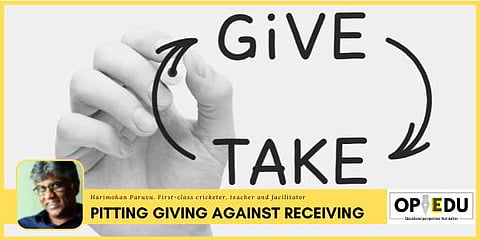

'Bhaiyya, I want to facilitate some change in our community where we help one another and optimise resource utilisation,’ said Rahul. ‘Since we’re talking about leadership, is there some way to make some change here?’
‘You’re right, Rahul,’ said Rinku. ‘Even I feel we need more bonding in our community. Right now we’re existing as individuals or small groups instead of a close-knit community. Any ideas, bhaiyya?’
‘Hmm,’ said Rakesh. ‘How about a Joy of Sharing activity in your community to promote bonding? You could start a Joy of Sharing club.’
‘What’s that?’ asked Rinku. ‘How does it work?’
‘Simple,’ said Rakesh. ‘Ask everyone in your community to share any items they may not be using which may be of some use to others. Things like books, clothes, shoes, electronics, sports goods, stationery, music, toys, furniture…whatever. Anything of use.’
‘Hmm, I do have many old books and comics that I am not reading anymore,’ said Rahul.
‘And I have some sporting stuff and music to share,’ said Rinku.
‘Awesome,’ said Rakesh. ‘First, get everyone who has something to share and pool everything together. Display everything in a commonplace and have people in the community come and take what they want. As simple as that.’
‘Anyone can take anything?’ asked Rahul. ‘For free? Even people who don’t give anything in exchange?’
‘Yes,’ said Rakesh. ‘The idea is to share unconditionally. Sharing is an activity that goes deeper than merely giving and taking. Sharing requires us to give up something we value, to let go of the old with gratitude, with grace. But giving does not come easily to most of us. We are used to holding on, to hoarding things. We fear if we give it away we may not get them again — though we may never use them again. So you see, we need to be secure as people even to give a small toy or a trinket, which could provide immense joy to a child. Just the act of giving changes us as people. And by providing a platform that allows people to give and share you will be doing others a great service. They will feel much lighter and better for having shared, knowing that their prized possession will be put to better use. What do you say, Rahul?’
‘True, bhaiyya,’ said Rahul. ‘Giving is a great thing.’
‘It is,’ said Rakesh. ‘But this activity is about something even bigger than giving. If anything this sharing exercise is about the second part — receiving. If we as people are bad at giving, we are doubly bad at receiving. In the Tao philosophy, receiving is considered greater than giving. Because by receiving, you are actually giving a chance for others to give. And while giving can be tinged with some sense of superiority, receiving requires complete humility.’
‘But bhaiyya, what’s the big deal about receiving?’ asked Rahul.‘Anyone can receive.’
‘It’s not as easy, Rahul,’ said Rakesh. ‘Our judgment, fears and our limited capacity to receive limit abundant inflows into our lives. For example if someone gives you something expensive and good for free, something you always wanted, will you take it? No. We are suspicious, fearful. We are not used to receive without conditions, without transactions. There is no simple receiving with love, trust. We think — what’s the catch? What will they ask later? Is it a trap? Will they think I am greedy? There are so many thoughts that go on in our minds. It just shows how messed up we have become, how averse we are to the act of sharing and receiving.’
‘True, bhaiyya,’ said Rinku. ‘Wonder why.’
‘Good question,’ asked Rakesh. ‘Children are good at receiving. They receive easily, joyfully and unconditionally. If we put an adult and a child in a shop and ask them to take what they want without any conditions, the child will comfortably take what she wants while the adult will not. It is this mistrust that comes in the way of free flow between people. Sharing builds trust in relationships. When people are transparent, child-like and open, it creates a fun and trusting environment in the community and benefits everyone.’
‘But won’t people take advantage?’ asked Rahul. ‘Should we not control things or have some basic rules? What if someone takes everything away?’
‘I think not,’ laughed Rakesh. ‘We are talking about trust here right. So trust. Remove all control. We have so many rules already which make us behave suspiciously. Let people give unconditionally without expecting anything in return and take what they want without conditions and rules. Let us as people get over our fears and apprehensions first, understand that there’s enough if we all share and receive.’
‘What about those who have nothing to give?’ asked Rahul. ‘Won’t they feel bad about taking?’
‘There’s no such thing as nothing to give,’ said Rakesh. ‘Sharing is not about how much or how big — anything that brings joy to the other is sharing. If there’s nothing material to share one can always share time, energy, smiles and happiness. After a few such activities you can see the energy in your community changing. People will start talking, bonding with one another. You can do it in a small community or a big one. Size is no bar for the joy of sharing. And it will have a ripple effect on society as well.’
‘I get it, bhaiyya,’ said Rinku. ‘It seems like such a simple idea but it can have a huge impact. It can change us deeply as individuals and as a community. Let’s start a Joy of Sharing club right away, Rahul’
Pro Tip: To improve bonding within the group and to change people as individuals and as a community, facilitate the joy of sharing and build trust. It helps individuals and the community to better utilise resources, be more giving and receiving and be more secure as people. It helps in establishing deeper connections with themselves and others.
